FINRA SERIES 65 EXAM PREP
Pass the Series 65
You already have knowledge of the finance industry and your role. Now, knock out the Series 65 with Achievable - the best and most effective Series 65 exam prep on the market.
Achievable exam prep includes our online textbook, review questions, and full-length practice exams.
You'll love studying with Achievable
Thousands of people trust Achievable exam prep to help them pass their most important exams
95%+
Success rate
50M+
Questions answered
2M+
Hours studied
This has helped me tremendously. The on hands learning with videos as well is a different type of mental learning.
I am pleasantly surprised at the quantity and quality of information supplied by achievable. I was skeptical at first, but after spending time with them I i highly recommend using them. If you are looking for more detailed information I would suggest looking somewhere else, but honestly all you need are the basics.
User friendly with lots of applicable information. Questions are similar to the actual exam.
Achievable is the best resource I've found. More so than with [competitor], or [competitor] I find the material "sticks" with Achievable's system of introducing new material, followed by review quizzes to master previous readings. It's incredibly easy to use, anywhere you are (at home on a desktop, laptop, or away with your mobile device) and actually interesting to read. Every other guide I've tried reads like stereo instructions.
Great job explaining concepts in enough detail to understand them and feel prepared and confident to take the exam.
Been studying for this for a week and this helped me more than the 300-page textbook I read. Thank you. I've been studying for these exams for almost 6 months and have been SO confused. Now I understand! Wow! you made it so clear! Thank you so much!
I think this program is very thought out and well organized. Being able to see things in their subjects was very good to see
Very simple to grasp concepts with well laid out formatting. Definitely makes getting through topics easy and efficient.
Stand out when applying for your dream job
Thousands of people succeed with Achievable and go on to amazing companies.






We're proud to point out that our students have landed great jobs, but we're required to note that Achievable is not affiliated with or endorsed by these firms.
Advanced personalization
Achievable Series 65 exam prep uses adaptive learning techniques to create and update a personalized model of your memory, individually tracking your retention and mastery of each FINRA Series 65 exam learning objective. Our learning engine monitors your study progress and continually adjusts your quiz questions to ensure you're focusing on the topics that matter most for you, improving study effectiveness while reducing overall study time.
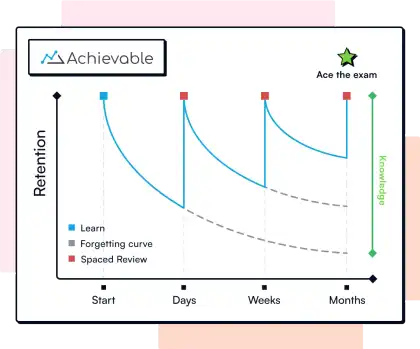
Full-length practice exams
With 1,300+ high-quality hand-crafted FINRA Series 65 practice exam questions, you can take 20+ full-length practice exams. Our Series 65 practice questions include all the types of questions you'll see on the exam, and they're weighted according to the official FINRA Series 65 exam rubric so you can have confidence in your scores.
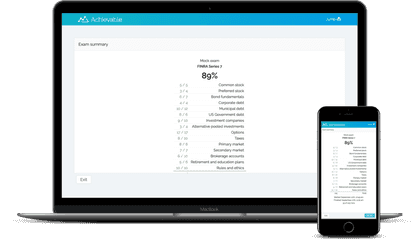
Review quizzes
Continually reviewing the material you've learned while studying is essential, but you need more than simple Series 65 flashcards. In addition to our full-length practice exams, our Series 65 exam study materials include a separate quiz bank of 1,300+ review questions so you can quickly drill the key facts and regulations for any particular chapter.
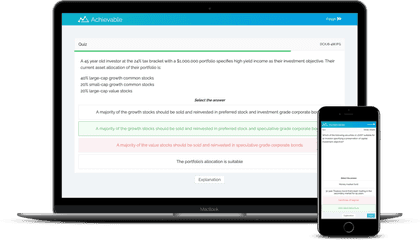
Easy-to-understand online textbook
You'll see within minutes why our full online Series 65 exam prep book is the best Series 65 exam prep - it's easy to understand and written in plain English, filled with straightforward explanations and real-world examples. Our expert author has 15+ years of licensing experience, and it shows. Achievable Series 65 study materials are easy to read, mobile friendly, and include detailed walkthroughs of sample questions. Each of the FINRA Series 65 sections are covered in detail in our Series 65 online course.
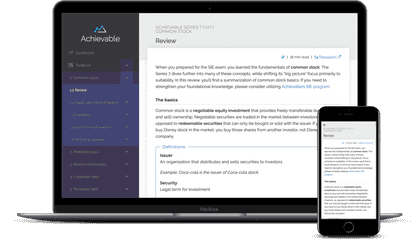
Videos on key topics
Achievable is an effective and efficient quiz-focused course - you won't have to sit through 100+ hours of boring Series 65 video lectures! Our courses have a reputation for being easy to understand. If you're a visual learner, we have you covered: we include bonus Series 65 explainer videos on key topics to ensure you can fully understand complicated concepts.
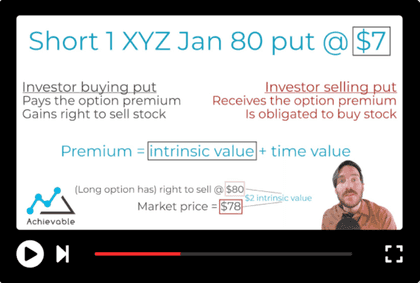
Modern platform
Whether you're studying on the web or a smartphone, the Achievable FINRA Series 65 exam prep platform UX is clean and responsive. Progress charts highlight your journey through the Series 65 course content and your current strength in each section.

Proven success
With Achievable, you will pass. The effectiveness of our courses is empirically validated with 2,000,000+ hours studied and 50,000,000+ quiz questions answered.
Controlled experimental studies with our corporate customers demonstrate that using Achievable results in ~15% higher scores, translating into significantly higher pass rates and career success.
How to get your Series 65
The Series 65 does not have any prerequisites, and you do not need to be employed by or sponsored by a FINRA member firm in order to register for and take the exam. However, the Series 7 is often considered a "co-requisite" for many financial advisor roles.
What's covered on the Series 65?
The Series 65 exam, known formally as the Uniform Investment Adviser Law Exam, covers the laws, regulations, ethics, strategies, and various topics important to the role of a financial adviser and offering financial advice. Passing the Series 65 (or the Series 66, which contains much of the material of the Series 65) is required for individuals to act as investment advisers in the US.
Despite commonly being called the "FINRA Series 65" it is more accurately a North American Securities Administrators Association (NASAA) exam administered by FINRA.
Topic
Test questions
Economic Factors and Business Information
20 (15%)
Investment Vehicle Characteristics
32 (25%)
Client Investment Recommendations and Strategies
39 (30%)
Laws, Regulations, and Guidelines
39 (30%)
When you buy the Achievable Series 65 course, you'll get access to our extensive question bank of 1,300+ chapter quizzes and 20+ practice exams.
Our practice exams are carefully constructed to match what you'll see on the actual Series 65, based on over a decade of training experience. Furthermore, our math-based questions are templatized so that you see different numbers each time, ensuring that you're learning the underlying concept and not just the right answer.
Series 65 exam details
The Series 65 exam - the Uniform Investment Advisor Law Examination - is designed to test an individual's knowledge and ability to advise clients in the area of investing and to discuss general financial concepts. The exam seeks to qualify candidates as investment adviser representatives. The exam covers topics, both regulatory and strategic, that have been determined to be necessary to understand in order to provide investment advice to clients.
The Uniform Investment Advisor Law Exam (aka the Series 65 exam) was created to qualify candidates as investment adviser representatives. The exam covers topics, both regulatory and strategic, that have been determined to be necessary to understand in order to provide investment advice to clients.
Despite commonly being called the "FINRA Series 65" it is more accurately a North American Securities Administrators Association (NASAA) exam administered by FINRA.
The Series 65 exam is hosted by NASAA and costs $187 to register. Participants have 3 hours to answer 130 multiple-choice questions. The passing score is 70.8% (92/130).
Eligibility and sponsorship
The Series 65 does not have any prerequisites, and you do not need to be employed by or sponsored by a FINRA member firm in order to register for and take the exam. If you are sponsored, you will need to fill out and submit U4, otherwise, just enrolling/registering is sufficient. The form and registration can be found at and submitted electronically on FINRA's website.
It is worth noting that while the Series 7 is not required for this exam, the Series 7 is often considered a "co-requisite" for many financial advisor roles.
Administration of the exam
The Series 65 exam is administered via computer. A tutorial on how to take the exam is provided prior to taking the exam.
Each candidate's exam includes 10 additional, unidentified pretest items that do not contribute toward the candidate's score. The pretest items are randomly distributed throughout the exam. Therefore, each candidate's exam consists of a total of 140 items (130 scored and 10 unscored).
There is no penalty for guessing. Therefore, candidates should attempt to answer all items.
Candidates will be allowed 180 minutes to complete the Series 65 exam.
Candidates are not permitted to bring reference materials to their testing session. Severe penalties are imposed on candidates who cheat or attempt to cheat on NASAA-administered exams.
Scoring of the exam
All candidate test scores are placed on a common scale using a statistical adjustment process known as equating. Equating scores to a common scale accounts for the slight variations in difficulty that may exist among the different sets of exam items that candidates receive. This allows for a fair comparison of scores and ensures that every candidate is held to the same passing standard regardless of which set of exam items they received.
FINRA's Series 65 exam summary
Economic Factors and Business Information
15%
20 questions
Handling economic cycles, financial reporting, analytical methods, and types of risk. Topics include monetary and fiscal policy, economic indicators, financial reports and accounting fundamentals, quantitative methods, and basic risk concepts.
Investment Vehicle Characteristics
25%
32 questions
The characteristics of different types of investment vehicles. Topics include cash and equivalents, fixed income securities and valuations, equities and equity valuation, pooled investments, derivative securities, and insurance-based products.
Client Investment Recommendations and Strategies
30%
39 questions
Developing a client portfolio, portfolio theory, and suitability. Topics include business entities and trusts; client profiles; capital market theory; portfolio management strategies, styles and techniques; tax considerations; retirement and estate planning; special accounts; trading securities; exchanges and markets; and performance measurement.
Laws, Regulations, and Guidelines
30%
39 questions
The laws, rules, and regulations regarding investment advice. Topics include state and federal securities acts; rules and regulations for IARs and Broker-Dealers; regulation of securities and issuers; communication with clients and prospects; ethical practices; and fiduciary obligations.
Achievable Series 65 content outline
1
Introduction
Introduction to the Series 65 exam.
2
Investment vehicle characteristics
Financial products, their characteristics, and relation to suitability (benefits and risks). Primarily focuses on equity securities, debt securities, pooled investments, derivatives, alternative investments, and insurance products.
3
Recommendations & strategies
Understanding client profiles, portfolio strategies, capital market theory, tax considerations, brokerage accounts, retirement plans, estate planning, trading securities, and measuring security performance.
4
Economic factors & business information
Time value of money concepts (IRR, NPV), utilizing descriptive statistics to accurately measure market and portfolio data, and interpreting financial and valuation ratios.
5
Laws & regulations
Rules and regulations related to broker-dealers, agents, investment advisers, investment adviser representatives (IARs), issuers of securities, prohibited practices, and ethical duties. Additionally covers regulatory powers of the Securities and Exchange Commission (SEC) and state administrator.
FINRA Series 65 resources
Check out our free Series 65 cheat sheets / Series 65 dump sheets and podcasts to help you prepare for the FINRA Series 65 exam or for a quick refresher on the Series 65 fundamentals.
Series 65 tutoring
Want one-on-one help with your studying? Check out Achievable's directory of FINRA Series 65 tutors.
Free FINRA Series 65 practice exam
Solve 10 free Series 65 practice exam questions to get a feel for what to expect on the actual Series 65 exam.

Achievable's FINRA podcast
FINRA course author Brandon Rith and guests provide actionable tips and topic reviews to help you pass your FINRA exams.

Dump sheet: General formulas
Quick reference sheet ("cheat sheet") for the Series 65 covering general formulas.

Dump sheet: Products, suitability
Quick reference sheet ("cheat sheet") for the Series 65 covering products and suitability.

Dump sheet: State laws, regulations
Quick reference sheet ("cheat sheet") for the Series 65 covering state laws and regulations.
Achievable Series 65 - $199
Pass the FINRA Series 65 on your first try with Achievable's interactive online exam preparation course. Includes everything you need: easy-to-understand online textbook, 1,300+ chapter review quizzes, and 20+ full-length practice exams.
Easy-to-understand online textbook
1.3k+ chapter quizzes
20+ practice exams
40+ bonus videos
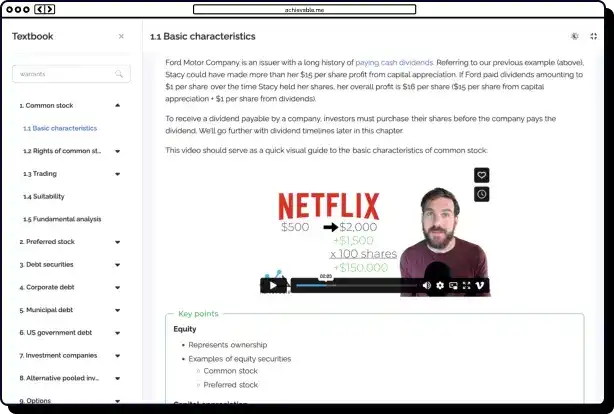
Learn from the best

Our content was written exclusively for Achievable by Basic Wisdom's acclaimed FINRA instructor Brandon Rith. With 15 years of finance-related experience and 10 years of licensing expertise, Brandon has helped thousands of learners successfully pass FINRA/NASAA exams while working for Fidelity Investments, where his programs posted pass rates that always exceeded company goals.
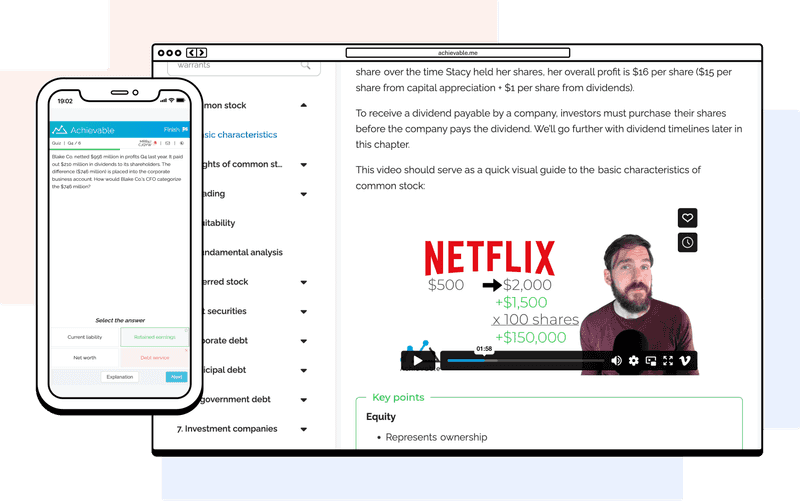
Pass the FINRA Series 65. Guaranteed.
Achievable is the best Series 65 exam prep course: effective, personalized, and convenient. With Achievable, you'll spend less time studying and pass your exam the first time, or your money back.
